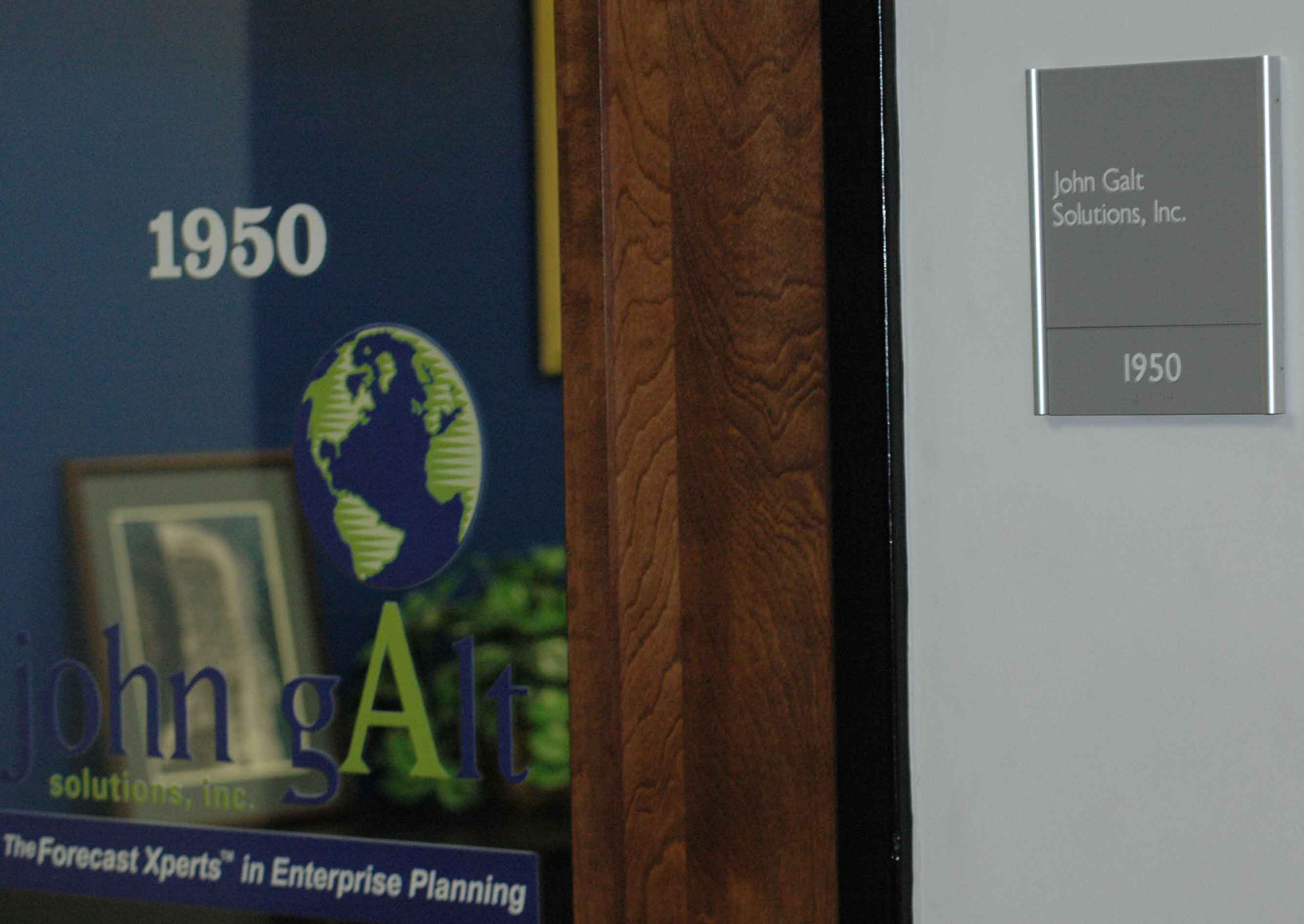LETTER: 'Market Share' as a goal for privatization attacks on public schools... Charter master plan targets gaining 'market share' in urban districts
November 14, 2009
Substance:
 For the entire time Arne Duncan served as Chief Executive Officer of Chicago's Public Schools, part of the 19th floor of the Chicago Board of Education's headquarters building at 125 S. Clark St. in Chicago was rented by an organization named "John Galt Solutions," which advertises that it engages in strategic planning following the vision of John Galt. "Who is John Galt?" is the famous opening line of the massive tome "Atlas Shrugged" by right wing fundamentalist Ayn Rand. With renewed scrutiny of Rand's philosophy and influence, researchers are also turning to the influence of the radical "free market" ideas promoted by Ayn Rand's disciples, including such noteworthies as Chicago's Arne Duncan and the staff of "John Galt Solutions." The photograph above was taken before the November 14, 2007 meeting of the Chicago Board of Education, at which Arne Duncan proposed further radical expansion of the city's charter schools while continuing to sabotage the remaining public schools, especially in inner city communities. Substance caption and photo by George N. Schmidt. The following was just unearthed. The plan to eliminate the public option in education is as clear as the plan not to have a public option in health care.
For the entire time Arne Duncan served as Chief Executive Officer of Chicago's Public Schools, part of the 19th floor of the Chicago Board of Education's headquarters building at 125 S. Clark St. in Chicago was rented by an organization named "John Galt Solutions," which advertises that it engages in strategic planning following the vision of John Galt. "Who is John Galt?" is the famous opening line of the massive tome "Atlas Shrugged" by right wing fundamentalist Ayn Rand. With renewed scrutiny of Rand's philosophy and influence, researchers are also turning to the influence of the radical "free market" ideas promoted by Ayn Rand's disciples, including such noteworthies as Chicago's Arne Duncan and the staff of "John Galt Solutions." The photograph above was taken before the November 14, 2007 meeting of the Chicago Board of Education, at which Arne Duncan proposed further radical expansion of the city's charter schools while continuing to sabotage the remaining public schools, especially in inner city communities. Substance caption and photo by George N. Schmidt. The following was just unearthed. The plan to eliminate the public option in education is as clear as the plan not to have a public option in health care.
From the Vault
The following part of an essay written in early 2008 by America Enterprise Institute /Fordham Foundation's Andy Smarick, a former Bush II Domestic Policy Council member tasked with K-12 and higher education issues:
Here, in short, is one roadmap for chartering's way forward:
First, commit to drastically increasing the charter market share in a few select communities until it is the dominant system and the district is reduced to a secondary provider. The target should be 75 percent.  Chicago school Chief Executive Officer Arne Duncan, above, smirked during testimony praising the expansion of Chicago charter schools during the November 14, 2007, meeting of the Chicago Board of Education, at which the above photo was taken. During his seven years as CEO of Chicago's public school system, Duncan followed a clear cut strategy, as outlined in the letter accompanying this photograph, to sabotage public schools, break the unions, and undermine the credibility of public school teachers and public education itself. A conservative ideologue, Duncan prided himself on getting away with more than even he anticipated during his seven years as CEO of CPS. In December 2008, President Barack Obama made Duncan U.S. Secretary of Education, where the same strategy and tactics are now being expanded across the entire USA. Substance caption and photo by George N. Schmidt.Second, choose the target communities wisely. Each should begin with a solid charter base (at least 5 percent market share), a policy environment that will enable growth (fair funding, nondistrict authorizers, and no legislated caps), and a favorable political environment (friendly elected officials and editorial boards, a positive experience with charters to date, and unorganized opposition). For example, in New York a concerted effort could be made to site in Albany or Buffalo a large percentage of the 100 new charters allowed under the raised cap. Other potentially fertile districts include Denver, Detroit, Kansas City, Milwaukee, Minneapolis, New Orleans, Oakland, and Washington, D.C.
Chicago school Chief Executive Officer Arne Duncan, above, smirked during testimony praising the expansion of Chicago charter schools during the November 14, 2007, meeting of the Chicago Board of Education, at which the above photo was taken. During his seven years as CEO of Chicago's public school system, Duncan followed a clear cut strategy, as outlined in the letter accompanying this photograph, to sabotage public schools, break the unions, and undermine the credibility of public school teachers and public education itself. A conservative ideologue, Duncan prided himself on getting away with more than even he anticipated during his seven years as CEO of CPS. In December 2008, President Barack Obama made Duncan U.S. Secretary of Education, where the same strategy and tactics are now being expanded across the entire USA. Substance caption and photo by George N. Schmidt.Second, choose the target communities wisely. Each should begin with a solid charter base (at least 5 percent market share), a policy environment that will enable growth (fair funding, nondistrict authorizers, and no legislated caps), and a favorable political environment (friendly elected officials and editorial boards, a positive experience with charters to date, and unorganized opposition). For example, in New York a concerted effort could be made to site in Albany or Buffalo a large percentage of the 100 new charters allowed under the raised cap. Other potentially fertile districts include Denver, Detroit, Kansas City, Milwaukee, Minneapolis, New Orleans, Oakland, and Washington, D.C.
Third, secure proven operators to open new schools. To the greatest extent possible, growth should be driven by replicating successful local charters and recruiting high-performing operators from other areas. Fourth, engage key allies like Teach For America, New Leaders for New Schools, and national and local foundations to ensure the effort has the human and financial capital needed. Last, commit to rigorously assessing charter performance in each community and working with authorizers to close the charters that fail to significantly improve student achievement.
In total, these strategies should lead to rapid, high-quality charter growth and the development of a public school marketplace marked by parental choice, the regular startup of new schools, the improvement of middling schools, the replication of high-performing schools, and the shuttering of low-performing schools.
As chartering increases its market share in a city, the district will come under growing financial pressure. The district, despite educating fewer and fewer students, will still require a large administrative staff to process payroll and benefits, administer federal programs, and oversee special education. With a lopsided adult-to-student ratio, the district's per-pupil costs will skyrocket.
At some point along the district's path from monopoly provider to financially unsustainable marginal player, the city's investors and stakeholders — taxpayers, foundations, business leaders, elected officials, and editorial boards — are likely to demand fundamental change. That is, eventually the financial crisis will become a political crisis. If the district has progressive leadership, one of two best-case scenarios may result. The district could voluntarily begin the shift to an authorizer, developing a new relationship with its schools and reworking its administrative structure to meet the new conditions. Or, believing the organization is unable to make this change, the district could gradually transfer its schools to an established authorizer.
You can practically check off each of Smarick's suggestions for a pro-charter policy environment, particularly in places like Los Angeles. The general silence of Right-wing education "reformers" (hell-bent, in reality, on destroying and privatizing public education) is not a coincidence — they're largely happy with Obama/Duncan's education agenda.
Welcome to "third way" centrism.
Kenneth Libby, Portland Oregon
Those who want to read more can go to Schools Matter articles on charters:
After Years of "Innovation," NJ Charters Perform No Better Than Poorest Public Schools
The Real Effects of Corporate Charter Schools on Public Schools
CEO Pay in Charter School Chains
Gloucester Parents Stage Protest Against Crooked Charter School Approval Ô£ø
Final edited version of this article posted at www.substancenews.net November 24, 2009, 5:00 p.m. CDT. If you choose to reproduce this article in whole or in part, or any of the graphical material included with it, please give full credit to SubstanceNews as follows: Copyright © 2009 Substance, Inc., www.substancenews.net. Please provide Substance with a copy of any reproductions of this material and we will let you know our terms — or you can take out a subscription to Substance (see red button to the right) and make a donation. We are asking all of our readers to either subscribe to the print edition of Substance (a bargain at $16 per year) or make a donation. Both options are available on the right side of our Home Page. For further information, feel free to call us at our office at 773-725-7502.
Ô£øComments:
By: Kenneth Libby
Source
Here is the link to the Smarick essay: http://www.accessmylibrary.com/article-1G1-172292777/wave-future-why-charter.html\r\r
-KL
By: Margaret Wilson
Retired teacher
KL
I tried clicking on the link listed above and it says the page cannot be opened or no longer exists. Do you know how else to access it?


By: john duffy
Even more Compelling!
Mr. Libby. Would you please provide the source, documentation of the Fordham Foundation plan on destroying public schools.